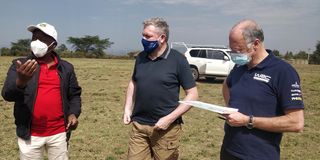FIA experts give lessons on safety

From left: WRC Safari Rally Chief Executive Officer Phineas Kimathi, Iain Campbell from the WRC Promoter and International Motorsports Federation’s Joao Passos during an inspection tour of the WRC Safari Rally’s Service Park in Naivasha on March 5, 2021.
What you need to know:
- “Safety is your pay document, your Bible, and the Events’ Safety Plan must be read, understood and ready to be put into use,” he added.
- The WRC Safari Rally will purchase the latest cutting extrication equipment like cutters or giant hydraulically operated pliers with jaws to complement what the government funds have bought.
- “Good stuff but dangerous,” he said.
Advanced training of safety and medical personnel for the World Rally Championship (WRC) Safari Rally 2021 will move to practical classes next month after a week-long Zoom theoretical lessons conducted by experts from the International Motorsport Federation (FIA) and Motorsports UK in Nairobi and Britain.
Rupert Hine and Sue Sanders conducted Zoom lessons from Scotland and England, respectively, to a group of over 30 local volunteers at the Kasarani Stadium WRC Safari Rally training centre moderated by another Briton in Kenya Dom Saunders, in Nairobi since last week.
He was assisted by heads of medical and safety departments Dr. Raj Jutley and Norris Ongalo.
Kenya has developed an elaborate medical and safety master plan using the FIA blueprint to ensure an incident-free Safari Rally, returning to the World Rally Championship after 19 years, mitigated by the lessons of a rally accident in 2018 and unrelated incident involving drink driving near the Safari route a year later.
The FIA attaches primary importance to safety and organisers invest heavily in medical and safety equipment operated by top-notch medical professionals considering the speed modern rally cars achieve.
Incidentally, the medical team scored the highest marks in the 2019 Candidate Event Safari Rally in the FIA card partly due to the experience of Dr. Jutley, an open heart surgeon and veteran of many WRC events including Rally GB Wales and the British military.
Hine said they will fly to Nairobi next month together with Sanders for practical demonstrations on how to extricate accident victims in an accident scene from location using the latest extrication equipment using old grounded rally cars.
Practical lessons were aplenty from Dr. Jutley. Under his direction, he impacted the invaluable lesson of ascertaining, and if critical, how to unblock airwaves of an injured accident victim, certainly invaluable knowledge in daily lives incidents, using two volunteers - Zimbabwean Dalu Vundla, and Jim Nyamu of Medical Safety volunteer in Technical Intervention Vehicle team.
“Protecting yourself is very important in order to protect others. Wear strong natural fibre attire like cotton, heavy boots, and gloves,” said Hine.
“Safety is your pay document, your Bible, and the Events’ Safety Plan must be read, understood and ready to be put into use,” he added.
The WRC Safari Rally will purchase the latest cutting extrication equipment like cutters or giant hydraulically operated pliers with jaws to complement what the government funds have bought.
“Good stuff but dangerous,” he said.




